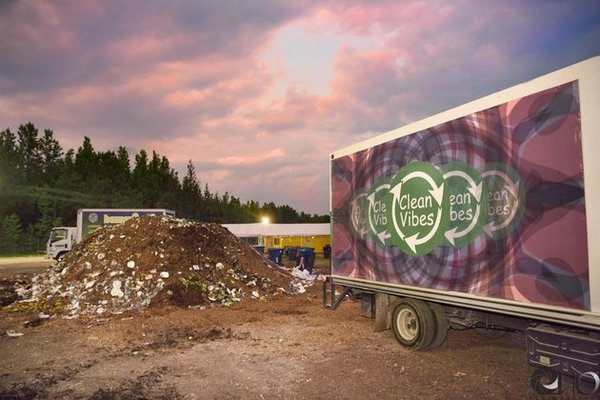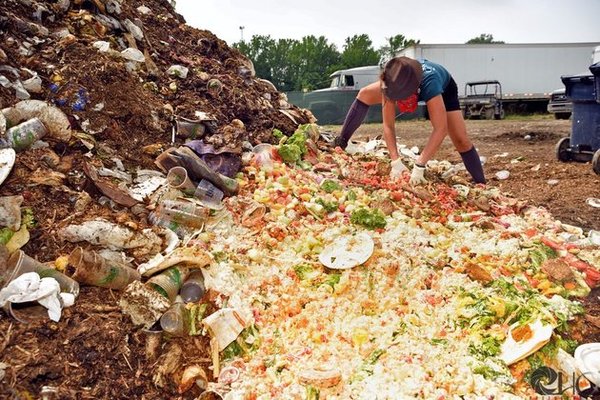People go to music festivals for a lot of reasons: to see their favorite bands, to burnish their Instagram feed, to sweatily camp out under the stars. But a group of volunteers came to the recent Bonnaroo Music and Arts Festival in Tennessee for a fairly unique reason: to save uneaten food from being thrown out and sent to landfills.
A group of 300 volunteers managed by Clean Vibes, a waste management company that works with dozens of music festivals to make them more environmentally friendly, spent the four days of the June festival helping to compost 230,000 pounds of food that was left over from caterers or that vendors were unable to sell. The volunteers received free tickets in exchange for their work.
In addition to the volunteering help, Bonnaroo’s own management team works with the festival’s in-house catering and food vendors to recover uneaten food instead of lumping it in with the rest of the event’s trash. Last year, it recovered and donated 29,183 pounds of food.
These efforts are in step with other major music festivals, which have made major strides in the past decade to minimize food waste at every level ― from managers to local community partners to individual festivalgoers.
A Sea Change
Clean Vibes used to have to convince festivals to try its services, but in the past decade, festivals have come to the company demanding waste management programs, according to owner Anna Borofsky.
“People used to think of us as tree-huggers when I founded Clean Vibes in 2000,” Borofsky told The Huffington Post. “But there was a sea of change around 2006 when recycling and sustainability suddenly became mainstream.”
Food waste is the world’s third largest contributor to greenhouse gas emissions ― behind the United States and China. When discarded food rots in a landfill, it releases methane, a powerful greenhouse gas. Properly tended compost, by contrast, doesn’t release methane, though it does emit carbon dioxide, a less potent pollutant.
It seems like every major festival in the past year has had a thoughtful program around waste management: Glastonbury, Outside Lands, Coachella, Electric Forest.
This may stem from the fact that music festivals are big businesses. In 2014, 32 million Americans went to at least one music festival, according to Nielsen. These events are a particularly big hit with millennials, who are known to be environmentally conscious.
“Recycling and sustainable waste management are absolutely consumer-demanded services,” said Borofsky. “Festivalgoers want to feel like these events align with their values.”
Food Vendors And Food Waste
“There’s a lot of trash at music festivals,” Tucker Gumber, a festival aficionado known as the “Festival Guy,” told HuffPost. “But not as much food waste as you may think.” This, he says, is because most festivals are supplied by food trucks, which are extremely resource-conscious by nature.
“For a food truck, wasting food is wasting profits,” Gumber said.
“When we’re cooking in a field, we budget every single supply and ingredient very closely,” Matt Shapiro, the owner of Peace Love Tacos, told HuffPost. His company served 25 music festivals in 2015 and will have served 17 by the end of 2016.
“Plus, food is relatively expensive within a festival, so people tend to clean their plates, in my experience,” said Shapiro.
Shapiro added that his company’s sustainability priorities have actually progressed beyond wasted food ― it’s trying to make its plates and utensils biodegradable.
“The key to successful food waste management is to make sure all the vendors’ materials, from utensils to napkins, are biodegradable and fall within EPA guidelines for composting,” said Borofsky.
The same principle holds at Outside Lands Music Festival in San Francisco, which uses only compostable or biodegradable utensils and food containers, according to Rolling Stone.

It’s not just American festivals that are being proactive about food waste.
At Norway’s Øya festival, which takes place every August, there is a longstanding environmental component and, in 2016, a particular focus on the issue of food waste.
In recent years, Øya’s food surplus was donated ― all of its biodegradable waste was converted into biofuel, over 8 tons in 2015. This year, the festival is finding even more uses for its food waste: It will compost some of it, and donate leftover coffee grinds to a local business that will make them into bars of soap.
The biggest challenge to preventing food waste in the first place, according to Borofsky, comes from the uncertainty as to how many people will be at a particular event.
“You basically have to over-prepare,” she said. “Because running out of food while people are trapped on festival grounds would be horrible.”
She had no immediate solutions to this problem, which is fundamental to event catering, but suggested that a diverse array of food recovery programs ― donating leftovers, composting some waste, converting other waste into biofuel ― would help mitigate its impact.
Leaving No Trace
The ultimate in festival waste management is probably seen at Burning Man, the annual gathering in the Nevada desert that takes place in a temporary city, which is completely dismantled at the event’s conclusion, leaving the desert essentially how it looked before.
Similarly, Tucker Gumber (the Festival Guy) is trying to encourage more personal accountability at music festivals, a philosophy he’s dubbed “Leave No Trace +1.”
“Basically,” Gumber explained, “the idea is, pick up after yourself at a festival and then pick up after at least one other person who isn’t as responsible as you.” He said that this could be extended to food waste by consuming food consciously and disposing of it properly, and then making sure a friend does the same.
“As much as festivals are stepping up with regards to composting and recycling, the truth is, the actual waste receptacles can be hard to find,” said Gumber. He noted that it takes an extra moment of intention ― particularly in the substance-influenced state of many festivalgoers ― to make sure you eat responsibly.
Another step that festivals are starting to take toward the Burning Man ideal is managing their food waste on-site, instead of resorting to external facilities. Bonnaroo is a leader on this front: The festival owns much of its Tennessee campgrounds, so it is able to compost much of its food waste onsite immediately after the festival.
Despite all these efforts, festivalgoers still say that waste is a pervasive and visual problem, particularly toward the end of an event.
“I know they are taking steps to reduce waste but I went to Governor’s Ball [in New York City] this year and it was honestly pretty disgusting,” Lauren Singer, of the anti-waste blog Trash is for Tossers, told HuffPost. Singer lives what she calls a zero-waste lifestyle, which means she aims to produce almost no trash.
Singer’s solution to festival food waste, much like Gumber’s philosophy, is to focus on personal accountability. She had a raft of suggestions for festivalgoers who want to minimize their food and food-related waste. Here are a few of her tips:
- Bring your own sustainably packaged snacks.
- Bring your own reusable utensils.
- Carry a stainless steel bottle for water and a glass mason jar for beer.
- Forgo straws altogether. (”Most people know how to drink without one,” she cracked.)
- Educate yourself on the festival’s waste management policy before attending.
“Ultimately,” she said, “I do think the responsibility falls on us at these festivals.”
Source: Huffington Post
Women of Green is TURNING UP THE VOLUME of the feminine voice on the planet in order to create the world we know is possible.
